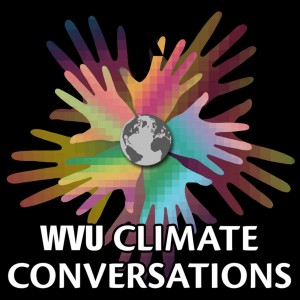From the Climate Conversations, WVU Daily Athenaeum, February 19, 2020
Kathryn Williamson, teaching assistant professor of physics and astronomy at West Virginia University, gives us an introduction to the WVU Climate Conversations podcast. Inspired by Katharine Hayhoe’s TED talk that, “the most important thing you can do to fight climate change is to talk about it,” students in the West Virginia University Fall 2019 Honors book club host their own climate conversations with a variety of guests.
Episode Transcription:
Hi everyone. My name’s Katherine Williamson. I’m a professor of physics and astronomy at West Virginia University, and I usually teach astronomy, but this semester I got the chance to lead a book club for the honors college. So the name of the book club, Climate Conversations, I chose after listening to Katharine Hayhoe’s TED talk, which says that the most important thing you can do to fight climate change is to talk about it. So that was the aim of every one of our book club meetings.
And that’s the aim of this podcast, is to keep that conversation going. We all have something to bring to the table. We all have a perspective that is valuable no matter how old or young where we live. If it’s rural or urban, whether we’re male or female, regardless of any sort of identity we have, we have our voice.
This podcast series is a result of students’ final projects in the climate conversations book club. I had seven students we met. The second half of the semester in Fall 2019 we read three books. The first book was the Two Mile Time Machine, which is about ice cores, climate change, and our future. Written by Richard Alley, Two Mile Time Machine is really about how we know the science of climate change throughout the eons. But when we dig through ice cores, we can see what was the temperature hundreds of thousands of years ago, what was the carbon dioxide concentration.
And then the second book we read was called Earth and Human Hands. That was written by a planetary scientist, David Grinspoon. He actually called into her book club meeting and we got to ask him lots of fascinating questions about the Anthropocene and how planetary science has really given us a perspective of our own planet by studying Venus and Mars and other planets, we can learn about home. So those first two books were very science heavy.
As a scientist myself, I felt compelled to make sure all the students in the book club got a chance to talk about the science and how we know what we know. But those two books kinda, they didn’t lead to as interesting conversations as our third book, which was called Renewable. Written by Eileen Flanagan about her search for the subtitle as her one woman’s search for simplicity, faithfulness, and hope. And she is a Quaker activist who had served in the peace Corps in Botswana and just found herself sort of in her midlife, struggling to live true to her values. And she became an activist who actually. Got arrested right outside of the white house because of pushing for more action on climate change.
So that sort of personal responsibility, I think spoke to a lot of students. And with this conversation with this podcast, we want to just encourage everyone, all of our guests, we want to highlight their voice and just show an example of what it means to have a climate conversation.
In this podcast, we’ll have a guest from the West Virginia House of Delegates, we’ll have a physicist. one of my colleagues here at WVU, we will have students talking about their experience, either studying abroad, studying history, or just trying to live sustainably on campus, and we’ll even talk to some activists here in West Virginia from the Citizens’ Climate Lobby.
So we’re getting a broad perspective, political, scientific, personal, and I hope there’s something in this podcast series that you can relate to, feel inspired by, and maybe you’ll have your own climate conversations after this.
>>>>>>>>>>>>>>>>>>>>>>>>>>>>>
See also: WVU Climate Conversations | Listen via Stitcher for Podcasts

